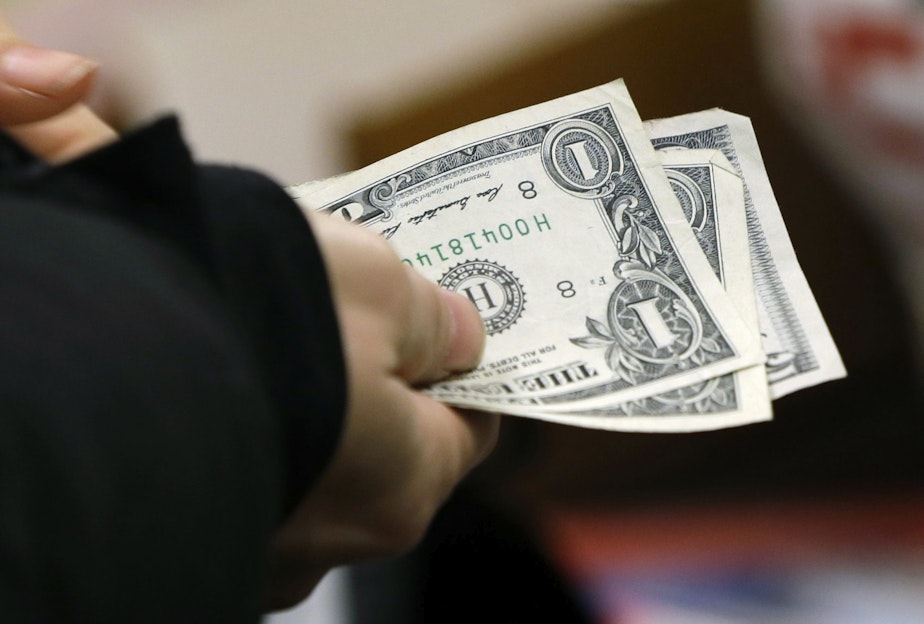Shutdown Highlights That Many Americans Don't Have Enough Saved For A Rainy Day

Federal workers affected by the partial government shutdown are set to miss a second paycheck this week, putting many in a precarious financial situation if they don’t have savings for a rainy day.
Almost 60 percent of Americans have less than $1,000 in savings, meaning an emergency expense would put many people in debt. That may seem like a large share of the population, but Jeanne Fisher, a financial planner at ARGI Investment Services, says that number doesn’t surprise her at all.
“Because so many people live paycheck to paycheck, they don’t even have the opportunity to build up a savings account,” she tells Here & Now’s Jeremy Hobson. “The one thing that I’ve really recognized over the past 10 years is it’s not so much about what you earn, it’s about what you spend, and we as a society — regardless how much money you have coming in every month — tend to spend every single bit of it.”
How Much Should You Have In An Emergency Savings Account?
“The general rules from the Certified Financial Planning Board of Standards is about three to six months of your expenses,” Fisher says. “Now I always tell people if you’re a dual-income household, maybe three months is enough. But if you have a high debt load, you only have one spouse earning an income, and you have maybe an unreliable career like a furloughed government worker, then you should actually be leaning more towards six or maybe even more months.”
Sponsored
What Expenses Should A Rainy Day Savings Account Pay For?
“When we use that statistic, three to six months of your expenses, we’re looking at all of your monthly expenses,” Fisher says. “Now potentially the only thing you could carve out are your regular savings. Of course, if you’re struggling just to meet expenses, any savings that you were doing every month you could carve out. But really if you are not expecting a paycheck for a certain time period, you need to be able to cover all of your expenses. Now that rainy day fund can be used for one-time hits like a car repair or a medical emergency. The key is that you build it back up so that again if you ever find yourself without a regular stream of income, you can continue to function.”
What Can You Do If You Don’t Have A Rainy Day Fund?
“I think there’s definitely other steps you should take first before tapping into your retirement,” Fisher says.
“I think the whole nation is really empathetic with all of the furloughed government workers,” she says. “So the first thing I would do is reach out to any creditors, any utility companies and actually ask for extensions on the payments or maybe to waive some penalties. That’s the first thing that I would do.”
Sponsored
Should You Rely On A Credit Card?
“I think that’s what most people will do because it’s the easy option but really that would be one of the last things that I do,” Fisher says. “Of course, if you have friends and family that you can ask for help and get an interest-free loan, that will probably be the best place you could go. I actually recommend for anybody who has a home equity line open on their house, which is basically a revolving line of credit on the equity in your home, that would be one of the first places that I would go to actually borrow money if you don’t have an emergency savings account.”
If You Have An Emergency Savings Account, How Should You Manage It?
“The most important thing is that they’re easily accessible and liquid,” Fisher says. “And so for the most part, you’re just looking at a checking or savings account or maybe even a money market fund. The goal of the account is not necessarily to earn significant return. The goal is to be there when you need it, and in our current interest rate environment, you’re probably not earning a whole lot of money on these savings accounts.”
How Much Money Should You Put Into It Each Month?
Sponsored
“I think it’s all going to depend on what your goal balance is,” Fisher says. “And I tell couples all the time as we advise them, find your magic number. Maybe it’s $25,000, maybe it’s $50,000. But that becomes priority No. 1. Hitting that goal amount is the first thing that you should be doing. And then once you hit that amount, then your priorities can change and you can start saving elsewhere. But that is a goal that you should be addressing aggressively.”
Julia Corcoran produced this interview and edited it for broadcast with Todd Mundt. Samantha Raphelson adapted it for the web. [Copyright 2019 NPR]
